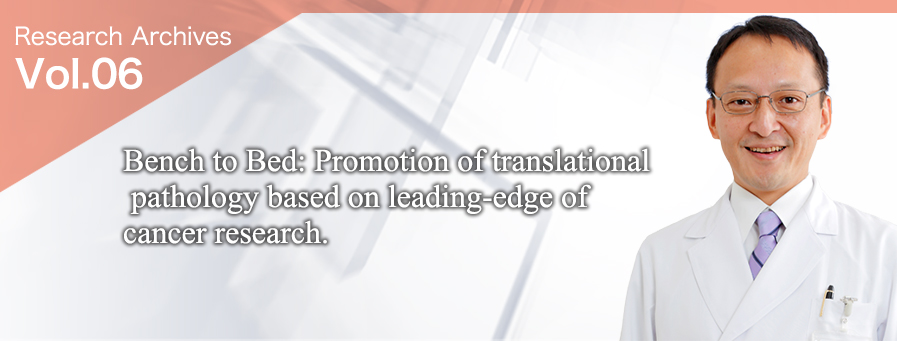
Department of Center Pathology, Graduate School of Medicine, Hokkaido University
Shinya Tanaka, M.D., Ph.D.Pathological
Science
- 1990: Graduated from Hokkaido University School of Medicine and joined the Department of Pathology II of the University.
- 1993: Clarified the signaling pathway from tyrosine kinase to ras, which is the current main target in molecular therapy, by identifying new genes in signal transduction research.
- 1994: Studied at Rockefeller University in the United States under the tutelage of Prof. Hidesaburo Hanafusa.
- 2000: Research associate at the Department of Pathology II, Hokkaido University School of Medicine. After a career as a lecturer and associate professor, appointed as a professor at the Department of Cancer Pathology, Hokkaido University Graduate School of Medicine in 2008. Also a professor at the Department of Translational Pathology (Endowed Department), Hokkaido University Graduate School of Medicine in 2008.
- 2002: Received the Incitement Award from the Japanese Cancer Association.
- 2003: Received the Incitement Award from the Japanese Society of Pathology.
Promote basic research based on pathological diagnoses to clarify the mechanisms of disease and develop personalized medicine for cancer therapy
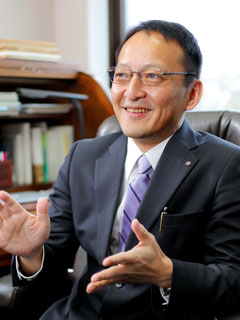
At the Department of Cancer Pathology, our policy is based on "translational pathology." It is a field of study that applies the findings of basic research into clinical care. At the laboratory of Prof. Shinya Tanaka, researchers conduct a leading-edge research of cancer, including studies on the mechanisms of diseases related to the initiation, metastasis, and recurrence of cancer, establishment of new pathological diagnostic methods. And development of advanced drugs and therapies for cancer.
"Recently, pathological diagnosis has been used to determine not only treatment but also what drugs to apply referred as companion diagnostics. Translational pathology is designed to further develop such a system to a more prompt and secure level. Especially, at our laboratory, we promote the translation of basic research evidence into clinical use that is focused on medicine for cancer therapy."
At the laboratory of Prof. Tanaka, there are many members who are well versed in molecular biology and cell biology, and they have identified many new genes deeply involved in cancer, along with signal transduction systems that promote the cell growth and the movement. In particular, the research conducted on signal transduction adaptor molecules CRK and DOCK, the laboratory was the first to discover these molecules and has led the world in this research field. The laboratory has made new findings also in research regarding the cancer stem cells, which cause the recurrence of tumors, as well as studies on micro-RNA as a new cancer biomarker.
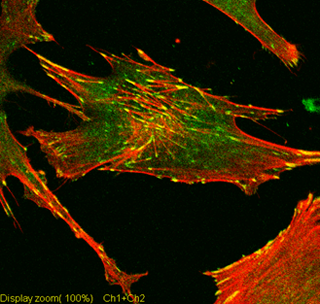
In 2013, Prof. Tanaka's research group clarified details on a new mechanism concerning metastasis and the recurrence of brain tumors, and the findings were presented in the May 2014 issue of the scientific journal Neuro-Oncology.
"We clarified a phenomenon called glial-mesenchymal transition (GMT). Radiation is an effective therapy, but recurrence occurs in some cases. We clarified that such recurrence is due to irradiation effect on cancer cells to undergo glial-mesenchymal transition. If we could predict in advance which patients might undergo glial-mesenchymal transition, this would lead to more effective treatment."
The laboratory receives more than 200 brain tumor pathological specimens a year from all over Hokkaido. Thus, the pathologists made a hypothesis by using patient's surgical specimens of tumors, followed by the evaluation of this hypothesis by carrying out a number of experiments using the radiation therapy equipment at Hokkaido University.
As a pathology laboratory, we have the advantage of having the access to use the resected tissues of many patients, which is made possible by having many pathologists in our laboratory and we daily conduct diagnosis along with research. We also receive requests for diagnosis from Asahikawa Medical University and Sapporo Medical University, which allowed us to obtain more data that led the conclusion of our scientific paper. We plan to apply our findings to develop methods to inhibit GMT and provide the great improvement of the patient's prognosis in the future. We are planning to work with Hokkaido University Hospital to establish a more effective personalized medical care."
Talented individuals from various fields are working together in joint research to clarify the mystery of cancer
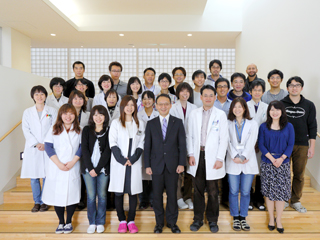 In 1993, in his research on the signal transduction of the adaptor molecule Crk, Prof. Tanaka clarified the signaling pathway "from tyrosine kinase to RAS molecule," which is necessary for the growth of cancer. Over the past 20 years, this finding has led to the development of molecular targeted drugs, such as the tyrosine kinase inhibitor, which is currently the main drug used for cancer treatment throughout the world. At the Department of Cancer Pathology, new signaling molecules, such as C3G, Dock180, and Dock2, have been discovered, and cancer signal transduction is one of the main studies conducted at the department.
In 1993, in his research on the signal transduction of the adaptor molecule Crk, Prof. Tanaka clarified the signaling pathway "from tyrosine kinase to RAS molecule," which is necessary for the growth of cancer. Over the past 20 years, this finding has led to the development of molecular targeted drugs, such as the tyrosine kinase inhibitor, which is currently the main drug used for cancer treatment throughout the world. At the Department of Cancer Pathology, new signaling molecules, such as C3G, Dock180, and Dock2, have been discovered, and cancer signal transduction is one of the main studies conducted at the department.
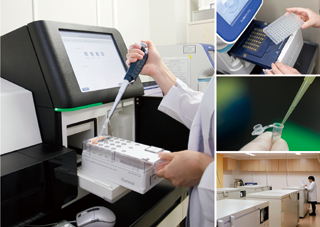
"Our research has developed substantially, due to these findings. Recently, we discovered that lung cancer cells through adaptor molecules interact with surrounding normal cells (cancer and the surrounding environment) to cause aggressive transformation of cancer. We are currently writing papers on this finding."
Such research findings have been applied to medical practice to support the treatment of many cancer patients. However, while molecular targeted drugs can be temporarily effective, the cancer develops resistance to them in many cases, resulting in a definite recurrence after few years.
"It is believed that stem cells, which can be thought of as "the boss of cancer cells," holds the cause of recurrence. Stem cells are hard to distinguish from normal cells, but we are currently working to develop a method to identify stem cells. If we succeed in this, it is expected to be an epoch-making research finding from Hokkaido University."
At Prof. Tanaka's laboratory, there are researchers from various departments, such as the Department of Health Sciences and other departments in the School of Medicine, the School of Engineering, the School of Veterinary Medicine, and the School of Pharmaceutical Sciences and Pharmacy. The laboratory has adopted a double-lecturer system of pathologists and lecturers with PhDs. In addition, researchers from multiple departments, such as the Research Center for Cooperative Projects "Frate" and the Department of Translational Pathology (Endowed Department), work together at the laboratory. Of special note, a joint research system has been established with Hokkaido University Hospital Clinical Research and Medical Innovation Center to develop personalized medical care using a next-generation sequencer in cooperation with many clinicians.
"Through a broad learning of pathology, I would like my students to foster a keen insight into the nature of things. Evaluations and values change with time, but it is important to pursue the essence of science without being carried away by such changes. We are open to a wide variety of sciences students, so please visit us if you are interested."
(Interviewed in November 2014)
"Good morning,
Dr. Robbins!"
Enjoying Tuesday mornings with a great text book
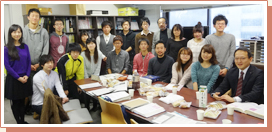 "Good Morning, Dr. Robbins!," a 40-minute study meeting, has been held before the lecture, every Tuesday morning for the past 30 years. Here, the students read an English text to familiarize themselves with medical English and terminology as well as experience the splendor of learning from books. The textbook is "Pathologic Basis of Disease," a great book first written by Stanley L. Robbins in 1957. Finding a new insight each time you read it, it is an ideal textbook to keep by your side for continue studying throughout your life as a medical doctor. At the study meetings, coffee and sandwiches are served to create a relaxing atmosphere.
"Good Morning, Dr. Robbins!," a 40-minute study meeting, has been held before the lecture, every Tuesday morning for the past 30 years. Here, the students read an English text to familiarize themselves with medical English and terminology as well as experience the splendor of learning from books. The textbook is "Pathologic Basis of Disease," a great book first written by Stanley L. Robbins in 1957. Finding a new insight each time you read it, it is an ideal textbook to keep by your side for continue studying throughout your life as a medical doctor. At the study meetings, coffee and sandwiches are served to create a relaxing atmosphere.


